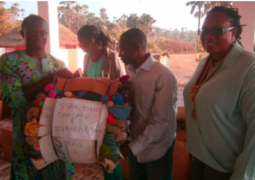Development in the global world today requires the organization of social and economic activity on a much larger scale. Increased scale brings with it opportunities for a wide range of benefits associated with lower unit costs of production, increased specialization and competition, access to a wider range of technology, and greater sharing of ideas and experience in all areas of endeavour. As Most countries from Economic Community of West African States (ECOWAS) are very small, not only in population, but also in terms of economic output, it is imperative for us to approach the global challenges leveraging our combined population and resources. Efforts are required on all these fronts to overcome some of the development challenges of today's fast-changing world.
ECOWAS Treaty, right from its inception therefore envisioned: a Community in which every individual and corporate citizen has the opportunity to realise his or its potentials; a Community in which social and economic justice is enshrined in law and embedded in practice; a Community from which poverty, unemployment and social exclusion have been banished; Community in which all citizens willingly accept a responsibility to contribute to the welfare of their fellow citizens and to the common good of the region; and one which serves as a vehicle for the exercise of the collective strength of the region, and the affirmation of the collective identity of the ECOWAS people. In pursuit of this vision, an initiative to establish a Common Investment Market (CIM) was approved by the ECOWAS Authority of Heads of State and Government on
The Acts when implemented would drive the single economic space within which business and labour operate; in order to stimulate greater productive efficiency, higher levels of domestic and foreign investment, increased employment, and growth of intra-regional trade and of extra-regional exports. Such internal market would become an appropriate response for the entire ECOWAS, its firms and citizens to meet the challenges of globalisation. As it is essential for economic growth, competitiveness and employment, the implementation of the CIM would enhance convergence and confidence, reinforcing the enlarged ECOWAS's ability to act as a single entity in a global context. The CIM would promote freedom of movement of goods, services, capital, business enterprise and people within the existing customs union. This requires harmonisation of policies, laws, and regulations; enhanced monetary cooperation, and common external economic policies, among others.
In light of the 'information deficit' regarding the CIM initiative among individuals and corporate citizens of the Community and the 'credibility gap' regarding its implementation following the slow pace of implementation of previous protocols, some are apprehensive about the possible adverse effects of consequent increased competition that is likely to arise from the CIM implementation process. In this regard, it is obvious that a much greater effort at public education and consciousness-raising is necessary. ECOWAS Commission believes that articulating a single development vision under the CIM offers an opportunity to show the regional public that it can be an instrument for achieving, within a regional framework, certain development goals that are difficult to achieve individually by member states. A single vision for the implementation of the CIM provides a framework of shared objectives to guide policies and the setting of priorities.
Propagating the awareness of the ECOWAS Common Investment Market (ECIM) among ECOWAS Citizens (corporate and individual) require the deployment of information and publicity materials on the initiative through conventional channels to which they are familiar. ECOWAS Commission, organized a sensitization workshop for the Media on the CIM. The mass media, comprising the newspapers, television and radio broadcast stations and outdoor publicity provides such regular modes of communication, education, social orientation and awareness building among these regional stakeholders. The extensive geographical and political reach of the mass media gives it the edge to communicate the nature and benefits of the CIM to all strata of the Community and assess the operational impact of the initiative on Member States. Feedback from the media workshop would become a veritable decision input in policy formulation, development, coordination and control, while steering the initiative toward the desired objectives.
The workshop recognizes the following as key issues at marketing the ECIM initiative: The creation of a platform or forum for journalists to interact with ECOWAS Commission on an ongoing basis around the ECIM initiative; There is need to promote awareness about the initiative through other print media ( i.e hand bills ,posters, brochures etc ) distributed to strategic places and strategic events within and outside the region; Media strategy should equally embrace creatively, the use of music, movies, cinema, theatre, radio and television in informing and educating individuals and corporate citizens of ECOWAS about the CIM initiative; There is also need to engage advertising as a complementary tool in the implementation process of the ECIM; Other tools identified in the enlightenment programme on ECIM include: new media (ie SMS on Telephone, E-Mailing on Internet, Face book, U tube etc); There is need for private and public sectors institutions and players to collaborate with ECOWAS Commission in the implementation of the ECIM process and; Create an annual award for rewarding excellent performance amongst journalists and media houses that support the ECIM initiative.
Read Other Articles In Article (Archive)

Rotaract club of Fajara donates educational materials to schools
Mar 24, 2015, 10:15 AM


